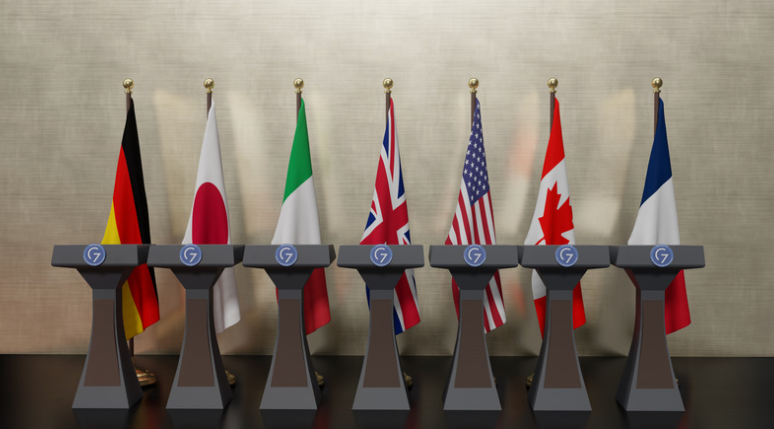G7 Leaders Establish Framework for AI Governance in Hiroshima Summit
Hiroshima, Japan, witnessed a landmark event as leaders of the Group of Seven (G7) nations concluded their summit on Saturday, culminating in a historic agreement focused on the regulation of artificial intelligence (AI). This initiative marks a pivotal step in establishing global standards for a technology that has generated both immense innovation and increasing concerns regarding its ethical and societal implications. The G7’s commitment to crafting a regulatory framework for AI illustrates the need for a diligent approach to governing a rapidly evolving domain.
Framework Principles and Objectives
The G7 leaders announced a framework that places a strong emphasis on transparency, accountability, and the responsible development of AI systems. This includes significant provisions requiring companies to disclose their AI algorithms’ operations, implement safeguards to mitigate bias, and establish mechanisms to prevent the misuse of AI technologies, particularly in contexts such as surveillance and disinformation campaigns. The framework aims to align technological advancements with shared societal values, ensuring that innovation does not come at the cost of democratic principles.
Addressing Escalating Concerns Over AI
The agreement emerges amidst escalating concerns surrounding the potential misuse of AI technology. Issues range from deepfake technology endangering electoral integrity to the military applications of autonomous weapon systems presenting threats to global stability. Additionally, the recent rise in generative AI tools, exemplified by applications like ChatGPT, has become a topic of discussion regarding issues such as data privacy, job displacement, and misinformation propagation. As the technology reshapes various facets of modern life, leaders emphasize the necessity of structured governance to guide its deployment thoughtfully.
Global Collaboration for Technological Governance
Various leaders at the summit voiced the need for international cooperation in managing the challenges posed by AI. Japanese Prime Minister Fumio Kishida highlighted the framework as a means to align innovation with shared democratic values, stating, “We are at a pivotal moment where AI can either become a force for good or a source of harm.” European Commission President Ursula von der Leyen echoed this belief, stressing that governance of AI cannot be an afterthought, but must actively serve to empower humanity.
Key Features of the G7 Framework
The G7 framework outlines several fundamental principles. Firstly, it mandates transparency and explainability in AI systems, particularly in high-stakes applications such as healthcare and criminal justice. Secondly, ethical safeguards will be instituted to prevent inherent bias and discrimination within AI algorithms. Moreover, the framework aims to promote international cooperation, recognizing that AI issues frequently transcend national borders. Lastly, accountability measures will be enacted, imposing penalties on developers and companies that cause harm or violate regulatory guidelines. A notable aspect of this framework is the proposal to establish an international body tasked with overseeing AI governance, drawing parallels to agencies that regulate nuclear energy and address climate change.
Industry Responses and Concerns
The initiative has garnered a spectrum of reactions from the technology sector. OpenAI CEO Sam Altman, whose organization is heavily invested in generative AI, expressed support for the agreement, citing the necessity for global coordination to cultivate safe and responsible AI development. Conversely, some leaders within the industry caution against overly stringent regulations that could hinder innovation. Sundar Pichai, CEO of Alphabet, emphasized the importance of balancing safety while allowing technology to progress and flourish. This duality highlights the ongoing tension between regulatory measures and the drive for innovation within the tech industry.
Challenges and Resistance Ahead
Despite the G7 Nations’ unified front, challenges abound as critics highlight potential enforcement weaknesses in the framework. There is apprehension that non-G7 countries, particularly China and Russia, which have made significant investments in AI development, may resist adherence to stricter international guidelines. Dr. Maria Chen, a technology policy expert, cautioned about the possibility of creating a fragmented approach to AI governance that could lead to a “two-speed world” where different nations operate under different standards, potentially exploiting regulatory loopholes for competitive advantages.
Looking Forward: A Step Towards International Consensus
In the future, the G7 nations aim to present their framework at the forthcoming United Nations AI Summit in Geneva, hoping to garner broader international support. French President Emmanuel Macron emphasized that this framework represents merely the beginning of a larger journey, stating, “The challenge now is to bring the rest of the world on board.” As society grapples with the comprehensive implications of AI, the G7’s agreement represents a concerted effort to mold the trajectory of this influential technology in accordance with universal democratic values and human rights.
Conclusion
The G7 summit in Hiroshima marked a significant moment in the global governance of AI, emphasizing the urgent need for responsible frameworks that guide technological advancement. By fostering transparency, accountability, and international collaboration, the G7 aims to mitigate risks while promoting innovation that serves humanity. As the world stands on the brink of a new technological era, the effective implementation of this framework and its acceptance by a broader global community will determine the future landscape of artificial intelligence and its implications for society.
FAQs
What is the G7’s AI framework?
The G7’s AI framework is a set of principles and guidelines aimed at promoting transparency, accountability, and ethical development of artificial intelligence technologies.
What are the key features of the G7 framework?
The framework focuses on transparency and explainability, ethical safeguards against bias, global cooperation, and accountability for AI developers.
What are the industry’s reactions to the framework?
Responses have been mixed, with some leaders supporting the initiative for global coordination, while others warn that strict regulations could stifle innovation.
What challenges does the G7 framework face?
Challenges include potential resistance from non-G7 countries, particularly China and Russia, and concerns about the framework’s enforcement mechanisms.
What’s the next step for the G7 regarding AI governance?
The G7 plans to present the framework at the upcoming United Nations AI Summit in Geneva to seek broader international adoption and consensus.

